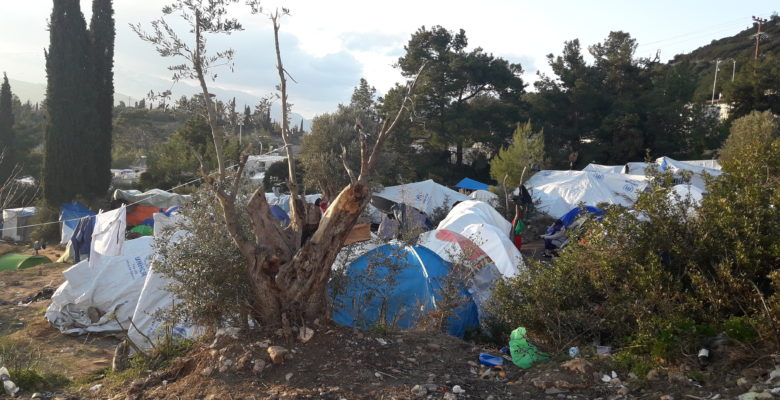Like a scene at the end of an adrenalised movie: a flimsy, overcrowded dinghy flailing in rough waves. Women, men and kids clinging to the sides, faces stretched in terror. There’s no land in sight – they’re going to capsize and drown. Just as the dinghy is tilting over, a bigger boat swings into view and slices towards them. They scream with relief as it approaches. Ropes are thrown, people being hauled up onto the deck as, with a small violent bang, the dinghy explodes.
This scenario is bone-close to the truth. Last month, 45 people drowned when their boat engine exploded in the notorious Straits of Sicily, between Libya and Italy. Another 37 people survived, some with horrific burns. Even then, many survivors were forced to remain at sea: Along with hundreds of other women, men and kids, they were stranded on volunteer rescue boats, including the boat that Banksy bought, the feminist-run LouiseMichel. These vessels were prevented from disembarking in European ports: they are literally circling the Mediterranean waiting to be granted permission to land. For days, the two nearest EU countries, Italy and Malta, both refused them landing.
Fast-forward just a couple of weeks. On 8th September, the infamous, filthy Moria camp on the Greek isle of Lesbos burst into flames, forcing more than twelve thousand people to flee onto the streets. They are now sleeping rough, scavenging for cardboard to sleep on. The camp has literally been burnt to the ground. Many of the locals Greeks don’t want them: they’re exhausted by the tensions, the sheer numbers, and the needs, of migrants and refugees. As Italy finally, relented, allowing several hundred of those stranded on the boats to land in Sicily (though others are still out there with nowhere to land), the refugees on Lesbos expose what’s now waiting for those arriving in fortress Europe. Because responsibilities are not being shared: refugees are treated as a problem no-one wants to solve. Rather than human beings seeking sanctuary, and better lives.
How did we come to this? Human beings being used like hostages, to ram home the point it’s really not worth trying to flee the Libyan, or Turkish coast for Europe: the door is not only shut, it’s hermetically sealed. A toxic narrative feeds this hard-line stance: when we reduce living, breathing human beings to “migrant flows,” (the term invoked by, amongst others the head of EU foreign affairs & security policy, Josep Burrell), we utterly dehumanise them. And ourselves in the process. If you doubt this, check some of the vicious jibes to the LouiseMichel twitter feed.
The hardline xenophobic logic that rescuing people drowning at sea will only encourage others to attempt the crossing is incoherent, not least because it makes no distinction between economic migrants and refugees (who have the right to claim sanctuary and asylum under international humanitarian law). Yes, the numbers attempting to cross the straits from Libya and from Turkey to Greece has gone down. But. The ratio of people drowning whilst trying to cross this stretch of the Med into Europe has proportionally risen, as NGOs and activists have been threatened with legal action for daring to save people who would otherwise drown at sea. To date, Italian, Maltese and Greek authorities have used anti-smuggling laws to prosecute volunteers. And in England, Anti-migrant protesters clashed with refugee support groups, and police, in Dover as more desperate women, men and children try to make it across the Channel to Britain.
There are few shrewder commentators on what’s really going here on than Patrick Coburn. Writing in the Independent newspaper about the pitiful dinghies trying to cross the channel to Britain, he joins up the toxic dots: ” What we are really seeing in those pathetic half-swamped rubber boats bobbing up and down in the Channel are the thin end of the wedge of a vast exodus of people brought about by military intervention by the US and its allies.” And who pays for these interventions, he asks. “This willingness to launch wars and to keep them going might be less if American, British and French leaders had to pay a political price for their actions. Unfortunately, voters have never understood that the influx of refugees, to which so many of them object, is the consequence of the vast displacement caused by these post-9/11 foreign wars.”
I’ve worked in the Middle East and several countries in Central and West countries where many, though not the majority of people, want to migrate. Their reasons were, of course, mixed: they wanted to make money to support their families (in economies shattered by violent conflicts) to live in more stable environments, to feel and to be safe. In each of these countries (the Central African Republic, Palestine and Mali) international politics has wreaked havoc with people’s’ lives and their aspirations. According to the US Watson Institute Costs of War project, ” at least 37 million people have fled their homes in the eight most violent wars the US military has launched or participated in since 2001.” And what the press often does not share is that the overwhelming majority of these people are not heading towards Europe. Nine out of ten refugees are hosted in low and middle income countries. The UN Commission for Refugees says 85% of refugees are hosted in developing countries outside of Europe.
We need to change the migration narrative: to demand our political leaders take responsibility for the mass displacements their violent political conflicts continue to create. We need to build peace on terms that give communities rights, and dignity, and a shared sense of an imaginable future for their children. Then refugees and migrants will no longer need to flee their homes for ours.

